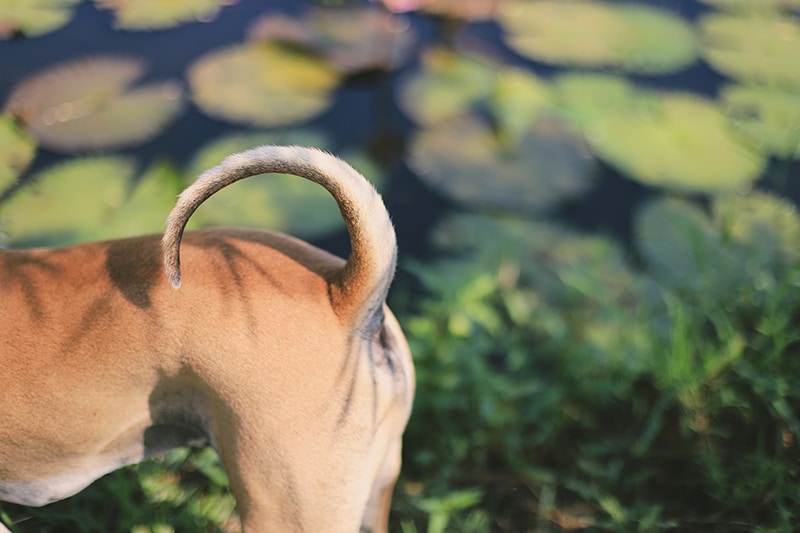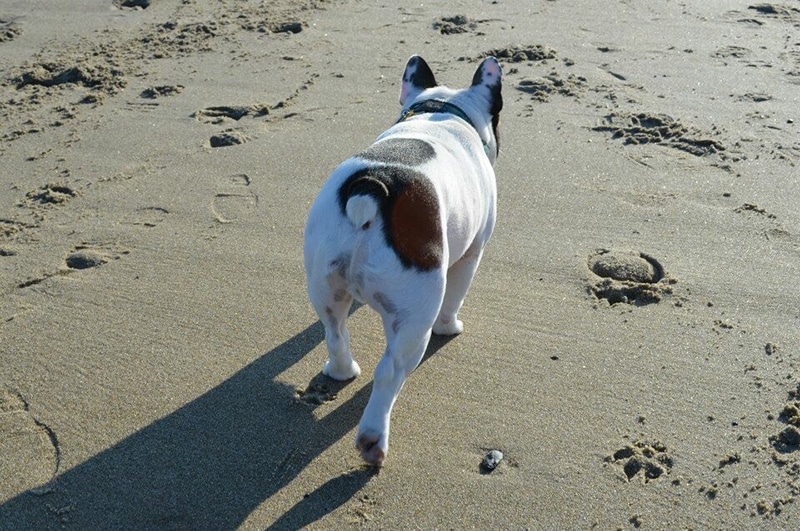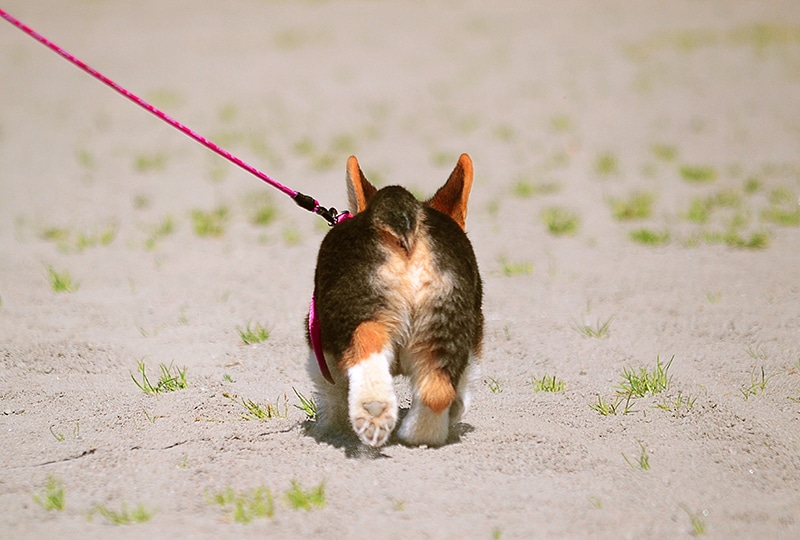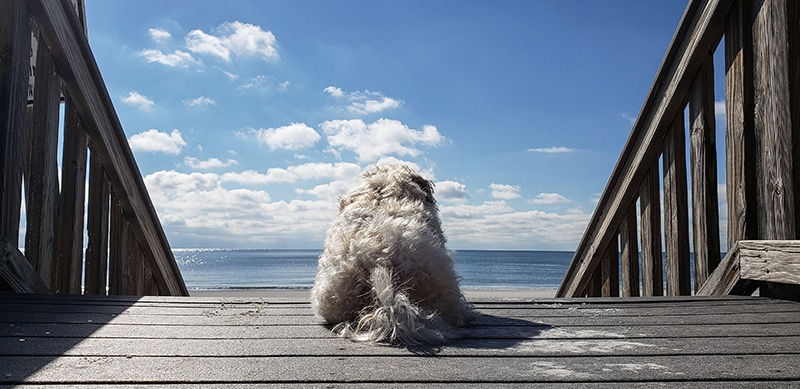If your dog suffers with their anal glands then expression by your veterinarian may be required occasionally. Depending on the specific situation, your dog may be in some pain after having their glands expressed. This is mainly in cases where the pooch is suffering with impaction, abscess or sacculitis (inflammation of the sac itself) and these conditions are painful even before being expressed.
I always tell my clients what to expect after expressing their fur-baby’s anal glands. Most dog’s experience mild discomfort afterward (my finger has just been in their butt, squeezing out the goo) for up to 24 hours but it shouldn’t affect their mood or lifestyle. dog’s with an infected or impacted anal gland are often prescribed anti-inflammatories/pain relief and/or antibiotics (if infected). If your dog is acting like they’re in pain after an uncomplicated expression or if you are unable to distract them from licking or chewing the area then you may need to contact your veterinarian for some advice.
Does your dog really feel pain?

Our canine companions can certainly feel pain and as a pawrent you know when your pooch is feeling a bit under the weather. dogs have pain receptors just like humans throughout their bodies, it’s an evolutionary tactic to help them avoid situations that may kill them.
Signs of pain include:
- Yelping
- Snapping
- Hiding
- Limping
- Licking the painful area.
- Crying when trying to poop
Common anal gland expression side effects and what to do about them
If your dog has had their anal glands expressed by your veterinarian then you may notice they continue to scoot their bum or lick at their tail and bum area for about 24 hours afterward.
This is completely normal as there will be some residual irritation after manual expression.
You shouldn’t need to do anything as this will pass though you can distract them by playing games or practicing some tricks to help take their mind off their bum.
Signs that your dog may be in pain after having their anal glands expressed include yelping and suddenly turning to chew at their tail or bum area or crying when trying to poop. If your dog does this then you should contact your veterinarian for advice. If your fur-baby tolerates it you can apply compresses to their bum to help ease inflammation.
Post anal gland expression care
After expression, your dog shouldn’t need any special care unless they had impacted anal glands or an infection that requires medications. Your veterinarian may recommend dietary changes if your dog has tummy issues, these may include adding fiber such as pumpkin or rice to your dog’s diet or avoiding certain proteins if they have sensitivities.
Can happen, but really rare
Complications following anal gland expression are exceptionally rare if performed properly. Manual expression by your veterinarian will involve placing the tip of their finger inside your dog’s rectum using lots of lubricant and gentle compression. This method completely empties the sac and reduces the risk of impaction.
If your furbaby has impacted or abscessed anal glands then they may rupture when expression is attempted which is painful and unpleasant for your dog. If your veterinarian suspects this might happen they may advise performing the procedure under sedation or anesthesia to reduce this risk and allow prompt treatment and cleansing of the area should the worst occur.
If you notice blood on your dog’s feces after anal gland expression or they are painful or unable to poop then you should make an appointment with your DVM.
How often would I need to express my dog’s anal glands?

Over-expression of your dog’s anal glands can actually increase the risk of irritation to the gland while external expression (the method used by groomers) can actually increase the risk of impacted contents as they’re not completely emptied by this method. If your dog is happy and not showing any indications of anal gland discomfort then it’s best to leave the area alone.
If your fur-baby does need repeated anal glands expression then the frequency will depend on their individual needs and you should monitor them for signs of discomfort.
Your DMV may recommend that your dog be checked every 4-8 weeks after an anal gland issue (impaction, infection, etc) to prevent a recurrence.
Some signs that your dog may need their anal glands expressed include:
- Licking and chewing at the base of their tail or around their bum
- Scooting their bum along the ground
- Unusual smell from their bum (can range from fishy to very stinky)
- Discharge from their bum
- Pain when sitting/not wanting to sit down
- Pain when pooping or not wanting to poop
- Redness or swelling over in the bum area
How to help your dog express their own anal glands?
If your dog needs their anal glands expressed then it’s best to make an appointment with your veterinarian to ensure they are completely emptied and there are no health concerns (infection, impaction etc) and to minimize the risk of complications for your pooch.
Ensuring that your pooch receives enough fiber and is eating a balanced diet to make sure that they have healthy, firm poops is the best way to help them express their anal glands naturally.
If you would like to learn how to express your pooch’s sacs at home, ask your veterinarian for a demonstration and explanation to ensure that you’re performing the procedure safely and effectively.
Things you can do to help your dog express their own Anal Glands:
- Make sure your dog receives enough fiber
- Maintain your dog on a suitable diet if they have any food sensitivities or allergies (your veterinarian will help you make a diet plan to suit your lifestyle and your dog’s needs)
- Avoid sudden/drastic changes in diet
- Weight loss if your pooch is a little portly as obesity weakens your pooch’s gluteal muscles and can make self-expression of the anal sacs difficult
Recommended Products For Dog’s Anal Glands
There are lots of products on the market targeted toward dogs with anal glands issues. The most popular product is Glandex. I’ve included two that I have found helped my patients
The Final Woof

Trips to the vet can be stressful for both pooches and their pawrents without having the added worry if your dog is suffering after having their glands expressed. While mild discomfort is to be expected after your pup has their anal sacs emptied, your dog shouldn’t be in pain unless they have an infection or severe inflammation of the glands. If your dog is expected to experience some pain, your veterinarian will prescribe some anti-inflammatory pain medications to help your fur-baby.
After having their anal glands expressed, many pooches will scoot their bum along the ground (or your pale rug) or lick their bum area for up to 24 hours afterward and this is normal and nothing to be concerned about. Crying, yelping, struggling to go to the toilet or prolonged behaviors mentioned above may be of concern and you should always ask your veterinarian what to look out for after your dog has their anal glands expressed. Going onward, ensure that your dog has everything she needs to express her own glands naturally.



My 9 yr old Beagle mix had his anal glands cleaned today. He is now at home but he is crying when he poops, pooped IN the house and ON the bed! He has never pooped or peed inside the house before!!!
I appreciate any ideas to help him. Thank you!
Hey Carol,
It sounds like there may have been some impacted or thickened material in their glands that has perhaps led to a little more inflammation than usual. Your pooch may be feeling like they need to poop urgently which has led to accidents in the house.
You can try warm compresses around their bum to soothe them and further express anything that may be lingering in his anal sacs.
If there’s no improvement, you notice blood or pus in their poo, or the accidents continue to occur then you should contact your veterinarian.
Our 7 yo pomeranian has a lot of problems with her anal glands. It’s not unusual to have her glands expressed, and a week later she is experiencing symptoms again. Is it safe to have her glands expressed so often? Anything we can do to help our fur baby? She does have hip issues and I am wondering if this is adding to the problem. Our other dogs will follow her around and lick her rear as well. Thank you.
Hey Sharon,
If this has always been a problem for your pet then it may be related to her anatomy. She may naturally have narrowed anal sac openings which could lead to these repeated issues that she has. Alternatively, if this is something more recent, it may be related to her hip pain if she’s not posturing normally to poop.
The best advice I can offer is to speak with your veterinarian to try to find the source of her issue. It may be that some dietary changes or additions may be all that’s needed or if part of her issue is pain then she may need to trial some medication.
My dogs yelping and he’s in pain after having his anal glands expressed what can I do to keep him comfortable and has pain and why is he doing this thank you
Hey Heather,
Unfortunately lots of pets have pain after anal sac expression and this is particularly evident in dogs that need frequent expression as they can suffer with chronic inflammation and sensitivity.
As this sounds like a recurrent issue you can discuss options for pain relief when his anal glands are expressed with your veterinarian.
In the mean time you can try warm or cool compresses (depending on which soothes your pet the most) and encourage play and walks to help take their mind off their bum.
Hi Sharon!
Do you recommend using the Glandex wipes to remove the fishy smell after the anal glands are emptied? I used baby wipes for sensitive skin but I don’t think that helped. Thinking of giving her a full bath this weekend but was wondering if it is worth buying their wipes.
Thank you!
Sorry about the wrong name. The system does not allow me to edit my comment and I wrote it on a small screen.
Hi Maria,
First, no worries.
These wipes are great for tough odors, they contain a natural enzymatic deodorizer. I tend to use them immediately after expressing anal sacs before the smell has a chance to set in, particularly for pets that have impacted material that is extra stinky.
Another option is to use your pets shampoo and just bathe the area (not a full bath) after expression. Not every shampoo is strong enough to eliminate the odor and equally some are too harsh on their delicate bum after expression of inflamed anal glands.
Only a week ago my I took my dog to have his anal glands expressed, but tonight they are leaking and also since having them expressed he started having accident in the house passing urine when he is fully house trained
I took my 10-year-old shih Tzu pebbles to get her anal glands done for the first time today I did not take her to the vet to pacifically get her anal glands but she had been having some symptoms of pain so I took her to the vet to find out what was wrong they suggested it was her anal plans took her back there and expressed her anal glands and now she is not acting like she’s in pain but she is staying still and she has poop on her butt and she it’s just staying under the couch should I be concerned
Hi Terri,
If she just had them today she may be feeling a little uncomfortable after the procedure.
Gently bathe her bum with warm water which will help remove the poop, may stimulate her to go to the toilet if she needs and will soothe the area.
If it persists then you should contact your veterinarian.
Hello my dog also is sore from her expression. I have heard you can use virgin coconut oil for relief. Its natural and also anti-bacterial and easy on their sore bottom. Is there any truth to this? thnks
Hi Adam,
Virgin coconut oil is unlikely to provide relief in itself but the gentle massaging action when applied may do just that.
My dog is having neck Spasums after have glands done. We have never seen this before. She is eating and drinking but just very depressed and twitching – not sure what to do.
Hi Kelly,
Hi, this sounds very strange. Without examining there are a lot things this could be. Take some videos and you should contact your vet for an appointment if they persist.
My golden retriever went to the groomer and she expressed his glands without even asking me. He’s two and I’ve never needed to have it done. Since then he every now and then will scoot his butt on the ground after he poops. Should I be concerned. We have an appointment next week so we will see what’s going on but just hoping for some advice.
If it’s only happening occasionally then it’s unlikely to be an issue. It’s no harm to have your vet give him a check over to be sure.
Hello Dr. Grey my name is Patrick Duckworth and I came to the web with a question about my 8 month miniature golden doodle and came across this patient Dr. Platform platform of yours and I found my answer in your intro which I found to be so helpful and explained so thorough. I just wanted to thank you for doing what you do and I will always from now on look you up for any question or issue. Again I was very impressed with how thorough you are and I could tell that you care very much and that you want to help animals everywhere wether you get paid or not and selfless people like you is what this word needs more of. Thank you
Your new fan,
Patrick Duckworth